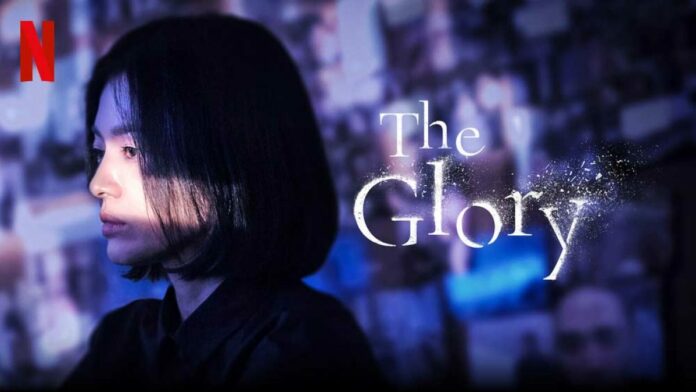Part one of Netflix’s new K-drama sets the stage for an action-packed part two
By VIVI KIM — arts@theaggie.org
Content warning: this article contains discussions of violence that some readers may find disturbing.
One of Netflix’s latest K-dramas, “The Glory,” is a thrilling revenge story that depicts the uncensored horrors of school violence and trauma. Set to release as a two-part series, the first half of the show was released last December, leaving viewers anticipating the second half’s release in March.
Actress Song Hye-kyo delivers a praise-worthy performance with her subtle and intimidating portrayal of the show’s main character, Moon Dong-eun. The protagonist and narrator is a teacher who was a victim of violence during her high school years. Growing up poor with an absent mother and no one to turn to for help, Dong-eun drops out of high school and dedicates the next 17 years of her life to plotting revenge against her classmates. The show wastes no time revealing this character’s tragic backstory, as the audience sees several flashbacks of brutal bullying scenes from the very first episode.
One aspect of the show that made it especially interesting was how it dropped subtle cues to portray the protagonist’s disturbing past, instead of telling the full story right from the exposition. The narration is from Dong-eun’s perspective, as she reads letters that she has written about her life. In an interview with Netflix, Kim Eun-sook, the writer of the series, explained that the letters were a way for Dong-eun’s character to keep a record of her life and remember her plans to seek revenge.
In the same interview, director Ahn Gil-ho discussed the design choice for Dong-eun’s room, which features a single mattress, no bed frame and barely any props. The only decor that stands out is a picture collage of Dong-eun’s bullies taped all across her walls and window. It was designed to look as lonely as possible, in order to show that she had been living only for revenge.
The burn marks covering Dong-eun from head to toe serve as a visual reminder to both herself and the audience of the irreparable pain and physical torture inflicted on her by her bullies. Dong-eun scratches these scars constantly throughout the show — there is even a scene where she collapses in panic after hearing the sound of grilling meat, showing just how deep her trauma runs, despite the confident and almost fearless adult version of Dong-eun that is shown up until this point.
Another significant part of the show, both with respect to the plot and as a stand-alone symbol, is the game of Go, an old Chinese board game where two players compete to possess more territory than their opponent. Dong-eun is determined to learn this game, as it serves as an important part of her grand revenge scheme.
Not long after the first episode begins, Dong-eun meets a character named Joo Yeo-jeong, an aspiring doctor who claims to be an expert at the game of Go. After agreeing to teach her, Yeo-jeong explains the rules: “While building your own territories, you destroy your opponent’s, tightening the boundary slowly.” He describes the game as “a battle fought fiercely, in silence.” This small but impactful line describes Dong-eun’s entire story and character motivation. Enduring 17 years of isolation, poverty and strenuous work for the sake of revenge represents her own silent battle.
The unsettling visual imagery depicted alongside elements of action, thriller and mystery make this series worth watching so far. Everything that happened in the first half of the show seems to be a subtle buildup for more heightened action scenes to come in part two, when Dong-eun’s plan for revenge might finally comes to fruition.
Written by: Vivi Kim — arts@theaggie.org









